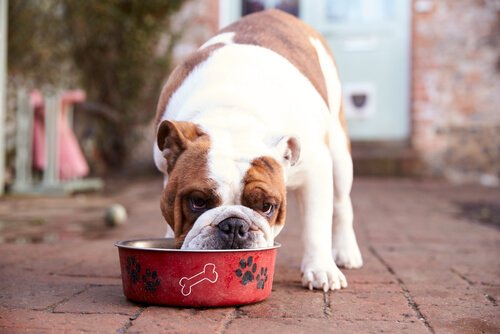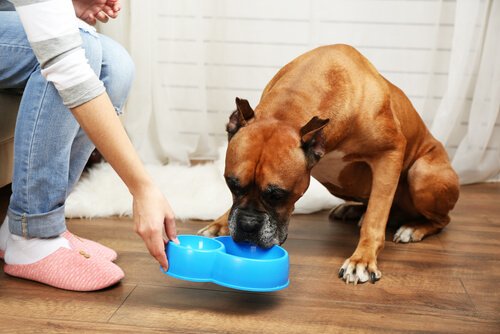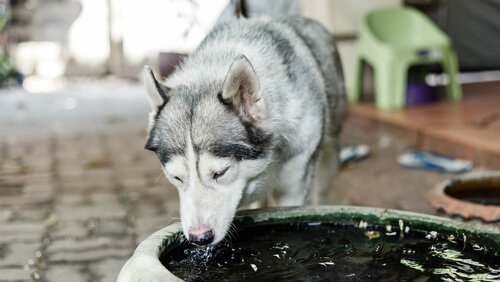Necessary Nutrients for Old Dogs

Aging is a natural process that happens to everyone, including man’s best friend. Nobody can stop time, but it’s possible to give your dog a better quality of life when they’re at an old age. Therefore, it’s important to give old dogs a nutritious diet. Continue reading to learn the basics of a balanced diet for senior dogs:
An old dog’s diet: more proteins, less carbohydrates
Dogs are considered to be at an old age when they’re between 7 and 12 years old. However, it may vary depending on the animal’s breed and demeanor. During this time, their physical activity decreases significantly and they start to lose muscle mass. This calls for changes in their daily diet.
It’s necessary to reduce the consumption of carbohydrates; this nutrient is the main source of energy for the body and must be included in their diet.

Dogs must eat the right amount in order to prevent weight gain. Excess weight can cause many diseases, such as hypertension and diabetes. Likewise, weight gain causes chronic pain and speeds up the degeneration from musculoskeletal diseases, such as arthritis and hip dysplasia.
Their diet must increase in high-quality proteins. Proteins are necessary nutrients for old dogs since they helpful for a when a dog starts to naturally lose muscle mass. Since they are easy to digest and break down into small molecules, they provide a great nutritional value.
Necessary nutrients for old dogs: vitamin C
When people get older, the cells in the body undergo an oxidation process. There are multiple consequences that are especially noticeable in the decrease in brain activity. Dogs experience a very similar organic process: the intense oxidation causes neurons to die, which results in dementia.
Dementia in dogs appears through a progressive loss of cognitive and sensory functions. Vision and hearing are the most easily affected senses, while smell is usually the most resistant to this degenerative process.
Over time, the animal begins to lose their cognitive abilities. This results in the inability to recognize commands and many difficulties related to space-time localization.
In such cases, vitamin C is one of the necessary nutrients for old dogs. This powerful natural antioxidant can slow down cellular aging, which delays brain degeneration.
Therefore, you can prevent and control the symptoms of senile dementia. It’s also recommended to give your dog certain substances, like Phosphatidylserine, to enhance the effects of vitamin C.
Fats in an old dog’s diet
Fats are an energy reserve and contain various canine hormones. Therefore, they must be included and controlled in an old dog’s diet. However, just like a human’s diet, there are good fats and bad fats for the canine diet.
Saturated or trans fats can facilitate weight gain and speed up the process of dementia. In contrast, unsaturated fats such as Omega-3 and Omega-6 are cardiovascular protectors and have anti-inflammatory and antioxidant properties.
It’s important to always keep an eye on your dog’s weight because some dogs can become extremely skinny when they get older; these are rarer cases that require a high consumption of beneficial and unsaturated fats.
Balanced diet for old dogs
A well-balanced diet for senior dogs must be based on specific, balanced foods. These dog foods have the right proportions of nutrients for old dogs.
Therefore, it’s important to pay special attention to the quality of the protein used. Many foods add too much vegetable protein– grains such as corn and soy– in their formula, which can be harmful to your dog’s digestion.
If the animal has difficulty chewing, it’s best to give them mashed food. To prepare it, simply add water or hot chicken broth over the food and let it sit. When their food is at room temperature, mix it well and serve.
Finally, you can also add pâté and wet foods to supplement their diet and make chewing easier.

Hydration for old dogs
An old dog naturally decreases the rate he drinks water, so it’s important to remember that water is a necessary nutrient for old dogs.
In conclusion, you should not neglect their diet or hydration. Make sure they always have fresh and clean water. If a dog is having difficulty or lacks interest in drinking water, you can switch to mashed dog food that has a good amount of liquid.
